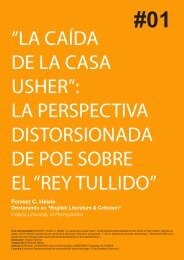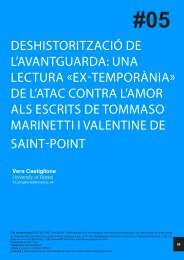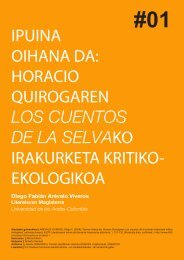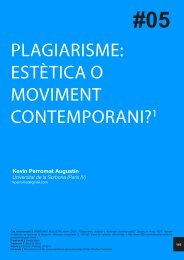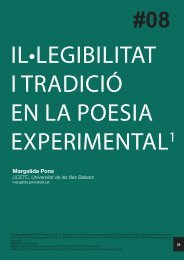a nation of ghosts?: haunting, historical memory and ... - 452ºF
a nation of ghosts?: haunting, historical memory and ... - 452ºF
a nation of ghosts?: haunting, historical memory and ... - 452ºF
Create successful ePaper yourself
Turn your PDF publications into a flip-book with our unique Google optimized e-Paper software.
“The past is never dead. In fact, it’s not even past.”<br />
William Faulkner<br />
Requiem for a Nun<br />
“El olvido es una de las formas de la memoria”<br />
Jorge Luis Borges<br />
0. Memory <strong>and</strong> Identity: Some comparative theoretical<br />
perspectives<br />
The study <strong>of</strong> <strong>memory</strong> <strong>and</strong> collective identity formation has become<br />
a major area <strong>of</strong> academic research in our days, cutting across the<br />
boundaries <strong>of</strong> long established disciplines in Social Sciences <strong>and</strong><br />
Arts <strong>and</strong> Letters. Narratives <strong>of</strong> <strong>memory</strong> <strong>and</strong> collective identity, <strong>and</strong> the<br />
academic discourses that examine them <strong>and</strong> construct them, have<br />
experienced enormous growth in recent years, <strong>and</strong> no discipline in<br />
the Humanities, whether cultural anthropology, literature, cinema,<br />
history or political science, has been impervious to its advance. As<br />
interdisciplinarity, with the advent <strong>of</strong> cultural studies, is fast becoming<br />
the norm rather than the exception in the dominant Anglo academic<br />
world, <strong>and</strong> gaining greater visibility everywhere, traditional boundaries<br />
are being redrawn, <strong>and</strong> the constitution <strong>of</strong> discreet fields <strong>of</strong> knowledge<br />
is undergoing an extensive transformation. Perhaps arguably, some<br />
<strong>of</strong> the most innovative leading-edge research in the Humanities is<br />
currently taking place at the intersections <strong>and</strong> margins <strong>of</strong> traditional<br />
disciplines <strong>and</strong> canons. The field <strong>of</strong> Comparative Literature, founded<br />
on the principles <strong>of</strong> interdisciplinarity <strong>and</strong> the cross<strong>nation</strong>al study <strong>of</strong><br />
literatures, is potentially well situated to pr<strong>of</strong>it from this paradigmatic<br />
shift, but is also subject to radical reconfiguration, as the traditional<br />
theoretical certainties that constructed its edifice have been eroded<br />
in recent years (such as eurocentrism, humanism, <strong>and</strong> universalism).<br />
So how are we to explain this unprecedented attention to the study<br />
<strong>of</strong> <strong>memory</strong> <strong>and</strong> identity in our age? What approaches has critical<br />
theory generated to deal with these issues, <strong>and</strong> what are the limits,<br />
possibilities, <strong>and</strong> challenges for cultural studies in general, <strong>and</strong><br />
for literary studies <strong>and</strong> comparative literature in particular? In the<br />
following pages, I will try to delimit some <strong>of</strong> the theoretical questions<br />
that inform the current debates <strong>of</strong> <strong>memory</strong> <strong>and</strong> collective identity,<br />
<strong>and</strong> their implications for the case study <strong>of</strong> contemporary Spain.<br />
Undoubtedly, the changing paradigms in current critical <strong>and</strong> literary<br />
theory have directly influenced the renewed attention to <strong>memory</strong><br />
<strong>and</strong> collective identity studies. Poststructuralist theorizations <strong>of</strong><br />
difference, a central concept in any modern exploration <strong>of</strong> cultural<br />
identity, have radically repositioned the traditional configurations <strong>of</strong><br />
center <strong>and</strong> margins, <strong>and</strong> have questioned the exclusion/inclusion<br />
A Nation <strong>of</strong> Ghosts?: Haunting, Historical Memory <strong>and</strong> Forgetting in Post-Franco Spain - José Colmeiro<br />
<strong>452ºF</strong>. #04 (2011) 17-34.<br />
19




